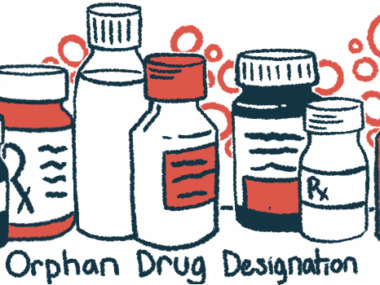ISB 1442 antibody therapy wins US orphan drug status
The bispecific antibody-based treatment interacts with both CD38, CD47 proteins
Written by |

ISB 1442, Ichnos Sciences’ investigational bi-specific antibody-based treatment, has earned orphan drug designation from the U.S. Food and Drug Administration (FDA) for treating relapsed or refractory multiple myeloma.
The designation is awarded to therapies that show promise for rare diseases, those affecting fewer than 200,000 people in the U.S. It comes with regulatory support and financial incentives, including a seven-year period of marketing exclusivity if it’s approved.
“Receiving orphan drug designation for ISB 1442 is an important milestone on Ichnos’ journey to developing potentially curative therapies for patients with multiple myeloma,” Cyril Konto, MD, president and CEO of Ichnos, said in a company press release. “Reported new cases are on the rise year over year, making the potential clinical applications for ISB 1442 more relevant than ever before.”
“It feels fitting to share this milestone during Multiple Myeloma Awareness Month, when our industry joins with patients and healthcare providers to highlight our shared commitment to curing this disease,” Konto said.
ISB 1442 is being tested in a Phase 1/2 clinical trial (NCT05427812) that’s currently recruiting up to 121 adults with relapsed or refractory myeloma in Australia. Sites in the U.S. are expected to open later this year.
Eligible U.S. participants must have received at least three prior lines of therapy, including proteasome inhibitors, immunomodulators, and anti-CD38 therapies.
Anti-CD38 therapies such as Darzalex (daratumumab) work by binding to and blocking CD38, a protein that’s abundant on the surface of myeloma cells, thereby promoting immune-mediated tumor cell death.
Myeloma cells have ways of resisting CD38 inhibitor therapy, however. That’s in part due to the increased production of a protein on tumor cells called CD47 that helps them escape the immune system.
How does ISB 1442 work?
ISB 1442 is a bispecific antibody, meaning it has two “arms” that each interact with a different target — CD38 and CD47. On the other end, its “tail” contains a specialized region that attracts immune cells.
The antibody works to redirect immune cells to CD38-positive myeloma cells, triggering a cancer-destroying attack. At the same time, it blocks CD47 on cancer cells, making them more vulnerable to these attacks.
The potential first-in-class therapy was designed using Ichnos’ BEAT platform, which facilitates the development of more advanced immune cell engagers, or therapies, that bridge an interaction between immune and cancer cells.
Preclinical data indicated ISB 1442 was better than Darzalex at suppressing cancer growth in cell cultures and mouse models. Moreover, it was more specific at targeting CD47 on cancer cells than other investigational anti-CD47 antibodies, which could make it more tolerable and give it a favorable safety profile.
The ongoing Phase 1/2 trial initiated dosing in September. In its dose-finding Phase 1 portion, about 46 participants will receive increasing weekly doses of ISB 1442 under the skin until the highest tolerated dose is found.
That dose will then be used in the trial’s Phase 2 portion, which will involve up to 75 participants across two patient subgroups.
One subgroup will include patients who aren’t eligible for other regimens known to provide clinical benefit and the other will be made up of those who failed to respond to a prior T-cell directed therapy. T-cells are a type of immune cell with cancer-killing properties.
In addition to safety, the goal of that trial part is to assess the percentage of patients who respond to treatment and for how long these responses last. The treatment, given in 28-day cycles, will be continued for up to 18 months (about 1.5 years) until patients show disease progression, unacceptable side effects, or meet other discontinuation criteria.
Ichnos is also developing other therapies for multiple myeloma.
Its lead candidate, ISB 1342, is being evaluated in a Phase 1 trial (NCT03309111) of people with relapsed/refractory multiple myeloma. That therapy, which earned orphan drug status in 2019, simultaneously targets CD38 and CD3, a protein on the surface of immune T-cells.
ISB 2001, which simultaneously targets CD38, CD3, and BCMA, another protein at high levels on the surface of myeloma cells, is currently in preclinical testing.



